-
Car Reviews
- Car News
-
Car Comparisons
Latest comparisons
- Chasing Deals
Genesis makes an aggressive pitch at would-be Audi SQ5 and AMG GLC 43 buyers with the twin-turbocharged, 3.5-litre GV70 crossover.

The latest salvo in the Genesis product offensive lands in Australia this week in the form of the GV70 midsize luxury SUV.
This is fertile ground: midsize SUVs are Austraila’s favourite type of new car, and last year, more than 27,000 found homes – think models like the Volvo XC60, BMW X3, Audi Q5 and Mercedes-Benz GLC-Class.
Like those cars, the GV70 can be had with a range of engines, from a potent rear-drive 224kW 2.5-litre turbo petrol and a torque-rich 2.2-litre diesel for circa-$70,000.
At that point, the GV70 range takes an almost comical leap in performance to the car tested for this review: the top-shelf 3.5, which employs an all-new twin-turbocharged petrol V6 to produce 279kW of power and 530Nm of torque.
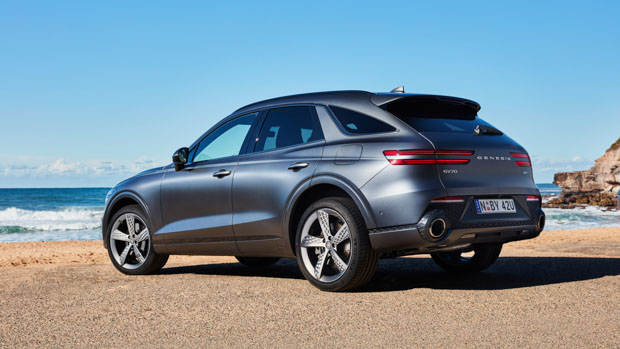
Seriously rapid in the real world, the six-pot GV70 shifts like an Audi SQ5 or BMW X3 M40i but costs twenty grand less. The AMG GLC 43 is faster but costs another $30,000.
Genesis, the semi-independent luxury arm of Korean giant Hyundai, already have a play in the large luxury SUV segment in the form of the BMW X5-sized GV80 – a vehicle Chasing Cars has run for six months.
For every two large luxury crossovers sold in Australia, though, three midsizers find buyers – so getting the GV70 right is key.
Has Genesis put its best foot forward?
The GV70 3.5 ($83,276 before on-road costs) tested here, optioned with a $6,600 Luxury Package, leaves scant change from a hundred grand once it hits the road.
That’s big money to spend on any car, let alone one from a relatively new brand, but the big-block GV70 starts to lure you in the moment you pull out of the dealership – or ‘studio’ in Sydney or Melbourne – for a test drive.
Feed in the throttle and just a tinge of low-end laggardness is quickly surpassed by the 3.5-litre petrol’s crashing wave of mid-range torque, which honestly shocks you the first few times you dig into it.
There is such a surprising surge as the full 530Nm of torque comes on and the reverse-oriented digital tachometer jumps skyward that you have to train yourself to be quite linear on the pedal.
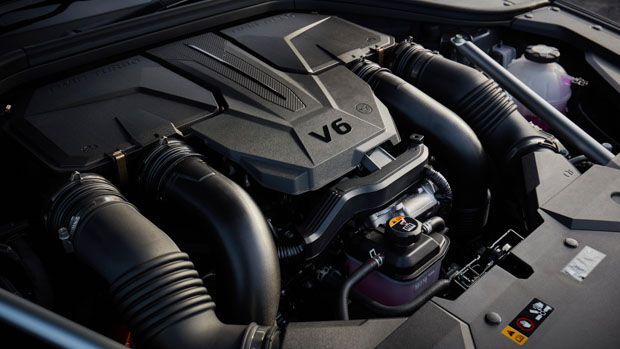
Or not. The GV70’s instant shove, particularly when you’re already rolling, becomes rapidly addictive. See a gap in traffic? That’s yours.
This engine ultimately trails the X3 M40i’s silken inline six-cylinder engine for outright refinement, but the slight rough-round-the-edges character makes the Genesis a bit of a loveable rogue.
In fact, it reminded us of a Kia Stinger SUV – albeit with superior finishings and a substantially improved stability control system. That comparison is probably not that far from the money – there are elements of the Genesis G70 / Kia Stinger chassis lying beneath the GV70.
We’re yet to drive the diesel, but our initial feeling is that the additional $16,000 required to jump from a base rear-drive GV70 2.5 to the range-topping 3.5 AWD makes sense. It adds some equipment, but the difference in performance is startling.
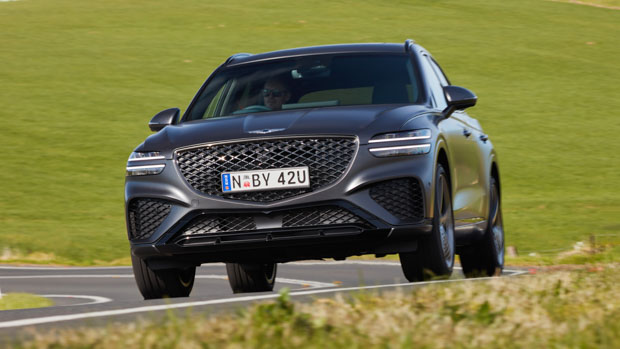
The 2.5-litre petrol makes 224kW/422Nm and is no slouch, but it’s far more attuned to relaxed cruising and the oft-alacritous six-cylinder car.
And just as we found in the larger GV80, this smaller SUV defies normal expectations of which variant ought to ride better.
The base petrol and diesel ride on small-ish 19-inch wheels and chunky tyres, but they have fixed dampers that are only passable for this segment in terms of compliance and providing a settled feeling on mixed tarmac.
21-inch wheels are optional on the four-cylinder cars and they are standard on the V6 – but the six-cylinder also switches the fixed suspension for adaptive dampers that are also informed by a road-scanning camera that identifies imperfections and primes the suspension.

That tech works (especially with good lighting conditions) and the suspension of the GV70 3.5 is noticeably more settled on smooth tarmac and absorbs bumps just as well as the 19s and fixed damper package on the base cars.
So it goes hard and rides well – but where the GV70 can’t keep up with its G70 sports-sedan sibling is in the corners.
The GV70 is hunkered down for an SUV and it turns in well on the impressive standard Michelin Pilot Sport 4 SUV tyres, but strike a bump when committed mid-corner and the combination of the 1.6m height and 2,038kg mass make themselves quite evident.
Corners can be strung together fluently on smooth, winding tarmac but the broken-up bitumen more common to Australian B-roads creates challenges for heavy and high-set vehicles, though the BMW X3 M40i is more eloquent when the difficulty is dialed up here.
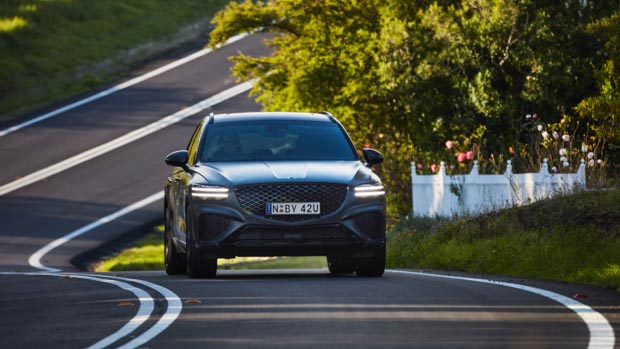
The GV70’s electronic power steering is relatively heavy in weight, even in the lightest ‘comfort’ setting, and while this does lend an air of expense and quality, the rack is a little slow in faster cornering.
As a highway bruiser, everyday commuter and occasional backroad partner-in-crime, though, the GV70 impresses, feeling every bit the quality item – and again, it’s so much cheaper than cars it will gap when you bury the throttle and awaken the six.
In particular, a smoothly-surfaced corner occasionally allows the opportunity to accelerate hard on exit, allowing the driver to sense the pleasant rear bias of the GV70’s AWD system. Power oversteer is there for the taking. For the brave (or perhaps daft), the electronic stability control can be disabled and in fact is disabled by default in the Sport Plus drive mode.
The six-cylinder car is uniquely fitted with a rear limited slip differential, which can be felt working away to keep corner exit tractability high, while bigger brakes are also standard kit.
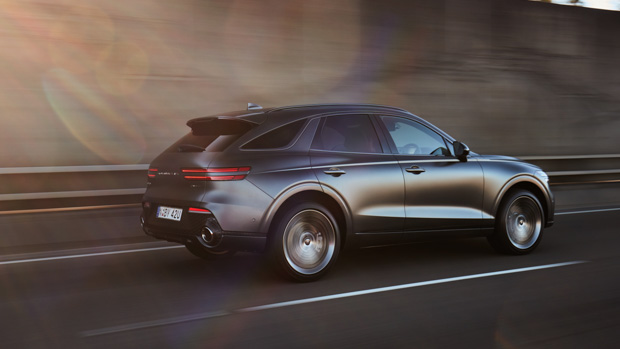
Acoustic glazed windows also make the GV70 remarkably quiet and relaxing on longer trips, where the hum of the road beneath and the wind are minimised impressively.
We continue to praise the dual blind spot camera technology used by Genesis and shared with subordinate marques Hyundai and Kia. Flicking the indicator shows a crisp live-feed of the left or right blind spot in the digital instrument cluster – left in place of the speedo and right in place of the tacho.
Like other vehicles sold by these brands, the tuning of the safety systems in the GV70 are well-tuned, with the lane centring noticeably superior to that of the Q5 or GLC and on a par with the X3.
Optioned as our test car was with the Luxury Package ($6,600), the GV70 3.5 is a more luxurious place to spend time than its German rivals.
That’s because few expenses have been spared in coating the various surfaces of the cabin in expensive materials: leather here, cold metal there, yielding plastic in other places. Even the kickplates around the door bottle holders are soft; suede headlining is a further bold flourish.
Buyers of Sport Line cars – which will account for most GV70s on the road, we suspect – can choose between black, red or navy blue leather themes inside, all paired with aluminium trim with integrated ambiently-lit shapes.
Rarer Luxury Line vehicles sans Sport package – a standalone $11,000 option on the four-cylinder variants – wear 21-inch wheels outside but have a luxe theme inside, with the choice of black, beige, tan, bottle green or burgundy leather inside. Green leather!
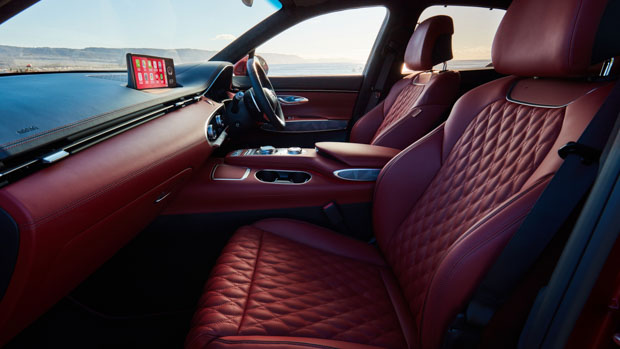
Genesis says it not carry dealer stock in Australia, with the brand instead encouraging all buyers to build and order the car they actually want. We hope Australians take them up on that call – if only to break up the sea of black and grey Teutonic crossovers.
The GV70 is much more similar to the larger GV80 in terms of cabin design and execution than the older G70 midsize sedan with which this crossover shares numeric nomenclature.
That means a broad, curvy, leather-wrapped dash incorporating a dramatic 14.5-inch superwide touchscreen that is also controllable via rotary dial – intelligently lifted and knurled, unlike the odd dipped trackpad in the GV80. Genesis are quickly learning.
Bright and high-resolution, the fourteen-inch screen displays appropriately mature maps and also is a good canvas for Apple CarPlay or Android Auto, which sadly remains wired due to an ongoing dispute at the Hyundai Group with the tech giants.
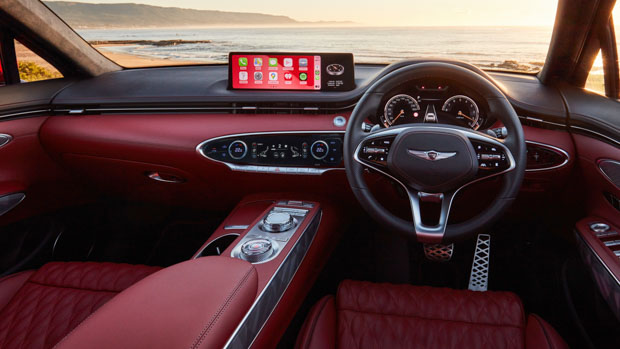
There are a few issues, though. The menus are arcane and complex in layout and depth, while quality control should catch mistakes like the date readout, which includes an erroneous space and comma between “August 12th” and “2021”, reading “August 12th , 2021”. A small thing, but this car costs a hundred grand.
The Luxury Package compliments the standard touchscreen with a 12-inch digital instrument cluster with eye-tracking 3D. The full cluster is a must – it annoyingly can’t show navigation like an Audi Q5, but the standard half-digital panel has an undercooked appearance, and the blind spot cameras work with a wider digital canvas.
Upholstered in lush nappa leather on Luxury Line cars, the front seats are cushy and soft, though Genesis should continue to study the firm-but-comfortable nature of the seats in an X3 or Q5, which offer better support for longer drives.
Seat cooling and heating is generously fitted range-wide. But just like the GV80, the front passenger is a second class citizen in this Genesis, with only the driver scoring the full 18-way Ergo Motion seat, with its thigh extender, adjustable side bolsters, and massage programmes.
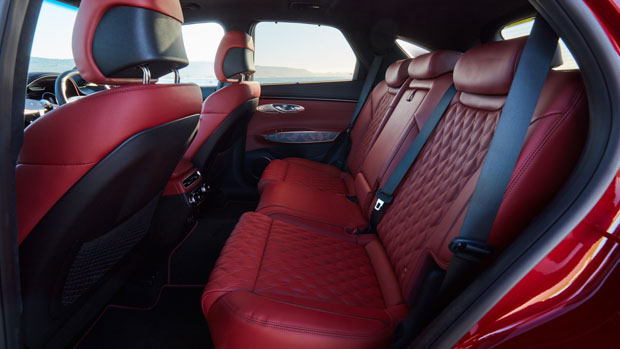
Back seat space is commendable for the class, with good legroom, headroom and toe room for six-footers sitting in tandem. Three will fit in the back row, which sports air vents and a separate temperature zone, though bigger families will prefer the more generous space of the GV80 with its compact third row.
A power tailgate opens to reveal 542 litres of room, with a space-saver spare sitting beneath the sturdy cargo floor, with the undertray also offering a perfect spot to store the removable cargo cover.
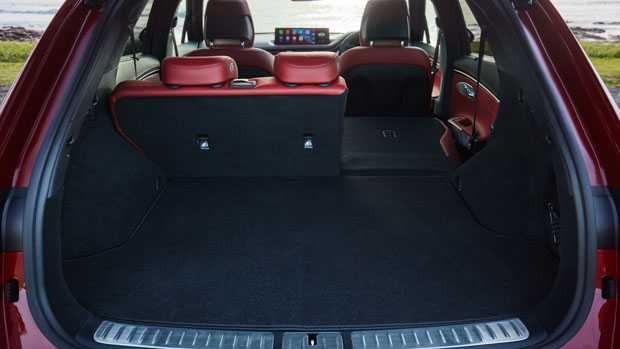
Equipped with the six-cylinder petrol, the GV70 has a prodigious thirst – mainly because of how it coaxes its driver to compulsively dig into that lush engine.
Genesis claim 11.3L/100km, which is pretty realistic for moderate drivers, but those that love the performance of the car will hit 15L/100km day-in, day-out. The car is rated for regular unleaded petrol but premium is certainly recommended for a complex motor like this.
Buyers will appreciate that the medium-term running costs basically stop there.
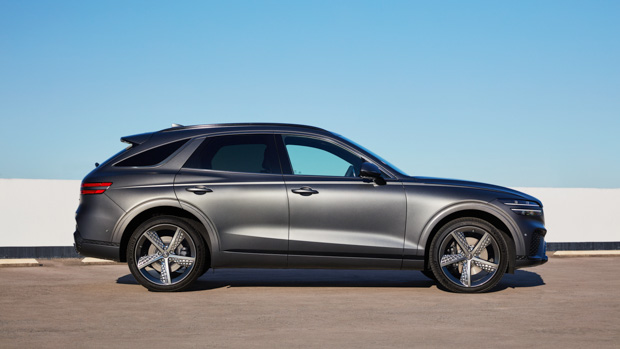
Like other Genesis models, the GV70 includes five years of scheduled servicing, which is equivalent to $3,000 to $5,000 at rival brands.
Service intervals come up at 12 months / 15,000km and the first five intervals are covered. Like Lexus, Genesis offer pickup and re-delivery of the car after a service, with a loaner provided in the intervening period.
Roadside assist is also included across the five year, unlimited kilometre warranty period.
The GV70 is the model Genesis truly needed to release to the market: a fighting-fit contender in the critical midsize luxury SUV segment.
There’s incredible bang-for-buck on offer here. A lusty six-cylinder engine generally costs in the realm of $120,000 in this segment, but Genesis will do it for 20 to 30 per cent less.
Despite that, the GV70 never feels cheap. The price will undoubtedly help to get prospective buyers through the door, but the luxurious interior and enjoyable driving dynamics seal the deal.
Key specs (as tested)
About Chasing cars
Chasing Cars reviews are 100% independent.
Because we are powered by Budget Direct Insurance, we don’t receive advertising or sales revenue from car manufacturers.
We’re truly independent – giving you Australia’s best car reviews.
The estimate provided does not take into account your personal circumstances but is intended to give a general indication of the cost of insurance, in order to obtain a complete quote, please visit www.budgetdirect.com.au. Estimate includes 15%^ online discount.
^Conditions Apply
Budget Direct Insurance arranged by Auto & General Services Pty Ltd ACN 003 617 909(AGS) AFSL 241 411, for and on behalf of the insurer, Auto & General Insurance Company Limited(ABN 42 111 586 353, AFSL 285 571).Because we don’t know your financial needs, we can’t advise you if this insurance will suit you. You should consider your needs and the Product Disclosure Statement before making a decision to buy insurance. Terms and conditions apply.
Indicative quote based on assumptions including postcode , 40 year old male with no offences, licence suspensions or claims in the last 5 years, a NCD Rating 1 and no younger drivers listed. White car, driven up to 10,000kms a year, unfinanced, with no modifications, factory options and/or non-standard accessories, private use only and garaged at night.
^Online Discounts Terms & Conditions
1. Discounts apply to the premium paid for a new Budget Direct Gold Comprehensive Car Insurance, Third Party Property Only or Third Party Property, Fire & Theft Insurance policy initiated online on or after 29 March 2017. Discounts do not apply to optional Roadside Assistance.
2. Discounts do not apply to any renewal offer of insurance.
3. Discounts only apply to the insurance portion of the premium. Discounts are applied before government charges, taxes, levies and fees, including instalment processing fees (as applicable). The full extent of discounts may therefore be impacted.
4. We reserve the right to change the offer without notice.